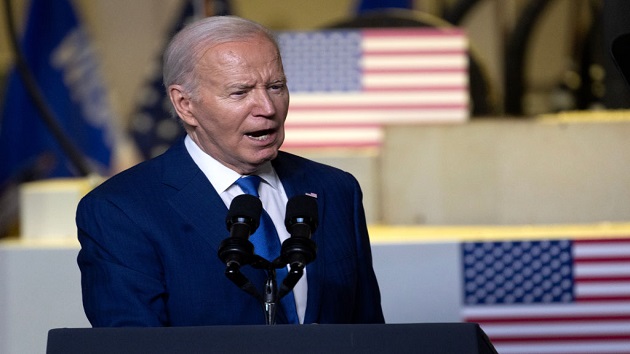(NEW YORK) — As Israel has stepped up its military assault on Rafah, the Biden administration has intensified its efforts to prevent its ally from launching its long-promised major ground invasion into the city in southern Gaza — a step that would cross a red line set by President Joe Biden and one that officials fear could derail negotiations to secure a cease-fire and free hostages imprisoned in the enclave.
Although Israel continued to launch strikes on Rafah and maintained control of the critical border crossing there on Wednesday, U.S. officials in Washington have continued to describe the operation as “limited in scope.”
But for the first time, the Biden administration is openly admitting it paused a delivery of thousands of high payload munitions and is intensely scrutinizing other arms shipments over concern that Israel will soon launch a major incursion into the city where more than a million Palestinians displaced by the conflict are sheltering.
Biden told CNN Wednesday that American bombs have been used to kill civilians in Gaza and he doubled down on his administration’s plan to withhold weapons that Israel could use as part of a major invasion of Rafah.
Earlier Wednesday, State Department spokesperson Matthew Miller declined to say whether the U.S. had communicated any specific terms for lifting the hold to Israel, but suggested the decision would hinge on what happens next in Rafah.
“I am not going to get into our internal conversations with the government of Israel,” Miller said. “I will say however, we have been pretty clear about what we want to see when it comes to an operation in Rafah — and that is we don’t want to see one unfold.”
Israeli Defense Minister Yoav Gallant said Wednesday that Israel would do whatever necessary achieve its mission in Gaza, in what appears to be a response to U.S. pressure to halt its operation in Rafah.
“I turn to Israel’s enemies as well as to our best of friends and say – the State of Israel cannot be subdued,” he said in remarks released by his office.
Beyond the latest surge of military action in Rafah, U.S. officials and international aid groups are also gravely concerned over Israel’s seizure not only of the Rafah border crossing between Gaza and Egypt, but also the closure of another key gate used to bring in humanitarian aid, the Kerem Shalom crossing between Israel and Gaza.
Although the White House said Israel had provided assurances that both gates would be at least partially reopened by Wednesday, the State Department said those promises had not been fulfilled.
Miller explained that humanitarian aid had been stopped at Kerem Shalom due to “logistical and security concerns on the ground” and that fuel necessary for distributing that aid through Gaza had not been allowed to enter through Rafah, sending the level of assistance for the enclave plummeting to what he called an “unacceptable” level as a humanitarian crisis continues to unfold in Gaza.
“We are making quite clear to the government of Israel that we need to see those decreases reversed. We need to get back to where we were, and we need to see the levels continue to increase and see those sustained, and that is why we need to see Kerem Shalom and Rafah opened,” Miller said.
Israel’s operations in Rafah, a direct response to a rocket attack on IDF troops launched by Hamas from inside the city, could also prove detrimental to ongoing negotiations to free the more than 100 hostages believed to be held captive inside Gaza in exchange for an extended cease-fire.
Hamas has indicated there will be no deal if Israeli forces continue to crack down on Rafah, but the militant group has continued to participate in talks — sending representatives to Cairo for talks on Tuesday.
Israel also deployed a delegation to the Egyptian city after Hamas made a public announcement on Monday declaring it had accepted a proposal for the deal.
U.S. mediators were caught off guard by Hamas’ announcement and initially believed the group had signed off on a framework that had been approved by Israel in late April.
However, the State Department said what Hamas had actually done was issue a counterproposal.
“We’re working through the details of that now,” Miller said on Tuesday, adding that the negotiations “maybe have never been more sensitive than they are at this moment.”
Despite the false start, the U.S. still believes a deal is within reach. CIA Director Bill Burns, one of the Biden administration’s most influential negotiators through the course of the conflict, has been in the Middle East since last week and visited Israel on Wednesday in an effort to push a deal over the finish line, according to sources familiar with the talks.
A U.S. official described Israel’s decision to directly participate in the talks as a positive sign but said coming to an agreement would likely ultimately require Israel accepting some of Hamas’ additional demands.
The official said one remaining gap concerns the state of the conflict after the prospective deal plays out. Hamas has insisted on a permanent ceasefire, a condition Israel flatly rejects because it would leave Hamas battalions intact inside Gaza.
Gallant signaled on Tuesday that negotiators could potentially find common ground — but said Israel would proceed with a major incursion into Rafah if they didn’t.
“We are ready to make compromises in order to bring back hostage,” Gallant said. “But if this option is not available, we will go and deepen the operation throughout the strip.”
Copyright © 2024, ABC Audio. All rights reserved.





